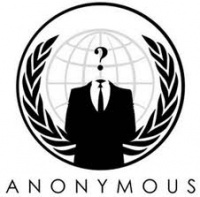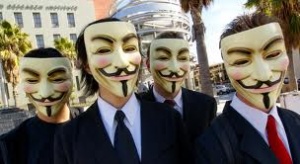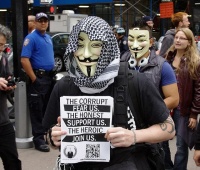Difference between revisions of "Anonymous (group)"
(→Treatment) |
(→Ethical Concerns) |
||
| Line 56: | Line 56: | ||
==Ethical Concerns== | ==Ethical Concerns== | ||
[[File:shadow_comp.jpg|thumb|left|300px| Anonymous is a very secretive online group]] | [[File:shadow_comp.jpg|thumb|left|300px| Anonymous is a very secretive online group]] | ||
| − | A wide range of ethical concerns surround the group Anonymous. These ethical issues can be broken down into a variety of categories to further analyze the ethical implications of such a powerful and close guarded group. Anonymous has engaged in a variety of activities online such as DoS attacks, cyberbullying, and various other forms of mischief online, creating both legal and ethical issues surrounding their activities. | + | A wide range of ethical concerns surround the group Anonymous. These ethical issues can be broken down into a variety of categories to further analyze the ethical implications of such a powerful and close guarded group. Anonymous has engaged in a variety of activities online such as DoS attacks, cyberbullying, and various other forms of mischief online, creating both legal and ethical issues surrounding their activities. Because the group involved in Anonymous attacks constantly changes, it is difficult to pin down any specific person(s) to draw charges against. |
===Privacy Issues=== | ===Privacy Issues=== | ||
Revision as of 04:20, 12 December 2012
Anonymous is an international group of hackers that originally began in 2003, with founding members coming largely from the popular imageboard 4chan. The group is a loosely organized collection of individuals who participate in anonymous actions online and get involved in various civil disobedience campaigns. A culture of secrecy is associated with the group; prominent members who reveal their identity lose their membership. Anonymity has allowed Anonymous to head many ethical controversies. The group largely attacks other groups in an attempt to support freedom of speech and expression on the internet.
Contents
Background
Origins
Anonymous allegedly formed in 2003 in response to a YouTube video titled Dusty the Cat in which a cat was abused by a then unknown boy only known as Timmy (see 4chan). The group quickly and successfully determined Timmy's true identity to be Kenny Glenn. With this information, they later caused him to be arrested for his cruel actions. The group met on a specific IRC (Internet Relay Chat) channel and kept other members informed through various websites.
Anonymous was largely quiet until 2006 and 2007, when they invaded the website Habbo, a social networking service centered around the idea of a hotel, with multiple versions of the same avatar (dressed in grey with an afro) used to block other users from entering the pool area. They blocked the users on the grounds that the pool was "closed for AIDS."[1]
Anyone can summon a call to action by Anonymous by posting on various message boards, although 4chan is the most common outlet for requests. In an army without a leader mentality, anyone can join the fight. Every battle that Anonymous engages in is composed of new and different individuals, making it a revolutionary force. Consistently, however, their main motivations are for the "lolz," for fun. [2]
Notable Contributions
Attacks against the Church of Scientology
In 2008, Anonymous launched Project Chanology, a systematic attack against the Church of Scientology in response to their request for a YouTube video to be taken down [3]. The video was of Tom Cruise, an advocate for the Church of Scientology, discussing the church. The types of attacks initially included denial-of-service (DoS) attacks against Scientology websites, prank calls, and black faxes to various centers.
Take-down of Visa Payment System
Anonymous disrupted Visa payment system as an act of revenge because of Visa's refusal to handle donations to Wikileaks, an organization known for publishing secret documents. They did so by overloading the site and taking out Visa's payment processing systems, which use the same network.[2] Additionally, they launched a campaign to send multitudes of Christmas cards to Josef Fritzl in jail. Yet another contribution was uploading flashing images to an epilepsy forum in an attempt to give users seizures. [2]
Occupy Wall Street Protest
The most notable, recent, and widely spread action of Anonymous has been the Occupy Wall Street protests and the Occupy Movement. Anonymous has not received substantial media coverage in regards to this, but the protests were originally called to order by the Anonymous' twitter account and AnonNews.org, the organization's anonymous website. The protests began largely as an outcry to hold people accountable for the financial crisis which toppled the United States economy. As time passed and the movement gained momentum, their main message evolved to general discontent with the economic structure in this country and the government's general lack of effort to change it.
Anonymous has since taken a metaphorical back-seat to the action, no longer organizing the protest, but rather "live tweeting" (continuously tweeting updates about the event and what is currently happening) about it and facilitating the continued live stream of video that emanates from the parks and streets where the protesters made camp. There is a possibility that some of the live streaming video hosts are in fact members of anonymous; however, that is unconfirmed, as no identities have yet to be uncovered by some sort of counter-hacking organization.
Take-down of Israeli Websites
In November 2012, in response to a threat made by the Israeli government to disrupt internet and telecommunications in and out of Gaza, an Anonymous member stated,
“We are ANONYMOUS and NO ONE shuts down the Internet on our watch. To the IDF and government of Israel we issue you this warning only once. Do NOT shut down the Internet into the “Occupied Territories”, and cease and desist from your terror upon the innocent people of Palestine or you will know the full and unbridled wrath of Anonymous.”[4]
Using coordinated attacks from many sources at once to overload and cause crashes of websites, Anonymous succeeded in shutting down over 600 Israeli websites. The databases of Israel Ministry of Foreign Affairs and Bank of Jerusalem were also targeted and deleted by Anonymous.[4]
Responses to Anonymous Actions
While the anonymous factor of Anonymous evidently makes it hard to connect specific individuals with the responsibility for the actions of the group, some steps are beginning to be taken. The Digital Economy Bill will allow net users to be disconnected on suspicion of copyright infringement. Additionally, tweets by Anonymous are being taken more seriously, interpreted as threats of terrorism, and police are starting to push for the power to disconnect websites. [2]
Ethical Concerns
A wide range of ethical concerns surround the group Anonymous. These ethical issues can be broken down into a variety of categories to further analyze the ethical implications of such a powerful and close guarded group. Anonymous has engaged in a variety of activities online such as DoS attacks, cyberbullying, and various other forms of mischief online, creating both legal and ethical issues surrounding their activities. Because the group involved in Anonymous attacks constantly changes, it is difficult to pin down any specific person(s) to draw charges against.
Privacy Issues
Anonymous organizes many of its operations to intentionally break privacy laws and expose personal information of those who they believe have wronged the American people. For instance, in a recent attack on banking giant Goldman Sachs, Anonymous revealed the name, address, phone number, salary, and personal email address of many of the top employees, including the CEO himself. This is a clear violation of the privacy laws laid out in our country; however, the inability by the authorities to expose the source of the hack has left authorities at a dead end.
Another notable privacy issue was the case of Dusty the Cat (see above). Not only was Kenny Glenn attacked by Anonymous, with all of his personal information including home address, phone number, etc. released online, but clients of his father's business were also contacted and made aware of his son's crime of animal abuse. When Glenn tried to change his name, his new identity was also released online, forever connecting him to his act of animal abuse and the consequent internet responses. Not only will Glenn be burdened by his act for the rest of his life, but so will his family and friends.
Treatment
Individuals generally have different opinions of Anonymous, ranging from approval to hatred. By analyzing Anonymous's actions and their impact on others, many ethical issues in regards to treatment arise. Anonymous generally engages in practical jokes and/or attacks to promote a certain viewpoint or to send a message. Their impacts, whether beneficial or damaging, tend to effect a wide range of people. Whether people approve or disapprove of this group, it is clear that Anonymous' actions effect thousands of people. For example, the reference to Glenn above demonstrates Anonymous's treatment of an individual both on and offline. Some may see Glenn's punishment as suitable and fair whereas other may condemn the extent of the situation and the everlasting mark the attack has left on Glenn's name. Regardless of one's viewpoint, the main concern is who is Anonymous to determine a suitable punishment for an individuals actions (or lack there of)? How far is too far? The same questions can be asked about DoS attacks as well. Ethically speaking, their conduct and treatment towards individuals and companies is on a slippery slope because many actions in an online world can be extended into the real world as well.
See Also
- 4chan
- Cyberlaw
- James H. Moor
- Online Identity
- Online Identity Theft
- Anonymous Behavior in Virtual Environments
External Links
References
- ↑ Wired: Palin Hacker Group’s All-Time Greatest Hits
- ↑ 2.0 2.1 2.2 2.3 Manuel, Rob. "The Ragtag Army Marches to a Political Tune; Once It Was Fun That Motivated Anonymous 'hacktivists'. Now It's Attacks on Internet Freedom." 10 Dec. 2010. Web. 15 Dec. 2011.
- ↑ Singel, Ryan (January 23, 2008). "War Breaks Out Between Hackers and Scientology – There Can Be Only One". Wired CondéNet, Inc.. Retrieved December 9, 2011.
- ↑ 4.0 4.1 http://www.washingtonpost.com/blogs/worldviews/wp/2012/11/17/anonymous-is-hacking-israeli-web-sites/



